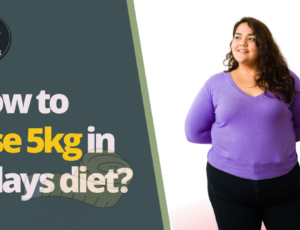
How to Lose Weight Without Counting Calories?

Losing weight can often feel like an overwhelming task, with the idea of counting calories adding an extra layer of complexity. However, the good news is that you don’t have to count calories to achieve your weight loss goals. In fact, there are several effective methods that can help you shed those extra pounds without obsessively monitoring every calorie that enters your body.
Table of Contents
Introduction
This article will delve into the art of losing weight without counting calories, exploring a variety of techniques that promote sustainable weight loss and overall well-being.

How to Lose Weight Without Counting Calories
Eat Mindfully: Embrace the Present Moment

Mindful eating is an art that allows us to fully engage with our food and connect with our body’s signals of hunger and fullness. In today’s fast-paced world, we often rush through meals, barely paying attention to what we’re eating or how much we consume. This lack of awareness can lead to overeating and weight gain. However, by practicing mindful eating, we can break this cycle and develop a healthier relationship with food.
To eat mindfully, start by creating a calm and peaceful environment for your meals. Turn off distractions such as the television or smartphone and create a dedicated space where you can focus solely on your food. Take a moment to appreciate the appearance, smell, and texture of the meal in front of you. As you take each bite, chew slowly and savor the flavors. Pay attention to the physical sensations and signals your body sends you.
By eating mindfully, you become more attuned to your body’s hunger and fullness cues. You learn to distinguish between physical hunger and emotional or boredom-driven cravings. This self-awareness helps you eat only when you are truly hungry, rather than out of habit or emotional triggers. It also allows you to recognize when you are comfortably full and avoid overeating.
In addition to promoting healthy portion control, mindful eating enhances your overall dining experience. By fully immersing yourself in the present moment, you appreciate the intricacies of each dish, discovering new flavors and textures that may have previously gone unnoticed.
This heightened sense of awareness can lead to a greater satisfaction with smaller portions, as you derive more pleasure from each bite.
Practicing mindful eating is a gradual process that requires patience and persistence. It is not about strict rules or restrictions but rather about fostering a mindful and intuitive approach to nourishing your body. By embracing the present moment and listening to your body’s needs, you can develop a sustainable and enjoyable relationship with food that supports your weight loss goals.
Focus on Whole Foods: Nourishing Your Body Naturally

In a world of convenience and processed foods, it’s easy to overlook the importance of whole foods in our diets. Whole foods are those that are minimally processed or refined, maintaining their natural state and nutritional integrity. They are typically rich in vitamins, minerals, fiber, and antioxidants, providing essential nutrients and promoting overall health.
When focusing on whole foods, prioritize fruits and vegetables. These vibrant and colorful foods are packed with vitamins, minerals, and phytochemicals that support optimal health and well-being. They are also low in calories and high in fiber, which helps you feel full and satisfied while promoting healthy digestion.
Whole grains, such as quinoa, brown rice, and whole wheat bread, are another vital component of a whole-food diet. Unlike refined grains, which have been stripped of their bran and germ, whole grains retain their fiber, vitamins, and minerals. This makes them a more nutritious option that supports weight loss by providing sustained energy and reducing the risk of overeating.
Including lean sources of protein in your meals is crucial for weight loss and overall health. Options like skinless poultry, fish, tofu, legumes, and Greek yogurt are excellent choices. Protein is not only satiating but also plays a key role in building and repairing tissues, supporting muscle growth, and boosting metabolism.
Don’t forget about healthy fats, which are essential for the absorption of fat-soluble vitamins and provide a sense of satiety. Opt for sources such as avocados, nuts, seeds, and olive oil, which offer heart-healthy fats that promote overall well-being.
One of the advantages of focusing on whole foods is that they are naturally low in calories, making them an ideal choice for weight loss without the need to count calories. By prioritizing whole foods, you nourish your body with the nutrients it needs while naturally reducing your calorie intake. Furthermore, the high fiber content of whole foods helps regulate blood sugar levels, supports digestive health, and promotes a feeling of fullness, preventing excessive snacking or overeating.
Incorporating whole foods into your diet requires a shift in mindset and a commitment to making healthier choices. Start by gradually replacing processed foods with whole alternatives. Experiment with new recipes and flavors to discover the joy and variety that whole foods can bring to your meals. With time, you’ll develop a palate that appreciates the natural goodness of whole foods, leading to sustainable weight loss and improved overall health.
Increase Your Protein Intake: Fueling Your Weight Loss Journey

Protein is an essential macronutrient that plays a crucial role in weight loss and overall health. When aiming to lose weight without counting calories, increasing your protein intake can be an effective strategy.
One of the key benefits of protein is its ability to promote satiety. Compared to carbohydrates and fats, protein is more filling, which means it can help reduce hunger and prevent overeating. Including protein-rich foods in your meals and snacks helps you stay satisfied for longer periods and curbs cravings, ultimately supporting your weight loss efforts.
In addition to its satiating effects, protein also has a higher thermic effect compared to other macronutrients. This means that your body burns more calories during the digestion and absorption of protein. By increasing your protein intake, you can slightly boost your metabolism, leading to increased calorie expenditure even at rest.
Moreover, protein plays a vital role in preserving muscle mass during weight loss. When you restrict calories, your body may break down muscle tissue for energy, which can slow down your metabolism. By consuming adequate protein, you provide your body with the building blocks it needs to maintain and repair muscle tissue. Preserving muscle mass is important because muscle is metabolically active and burns more calories than fat, even at rest. By increasing your protein intake, you support your metabolism, helping you burn more calories and promote long-term weight maintenance.
To increase your protein intake, incorporate protein-rich foods into your meals and snacks. Lean sources of protein include skinless poultry, fish, eggs, Greek yogurt, legumes, tofu, and cottage cheese. By incorporating these foods into a well-balanced diet, you not only support your weight loss goals but also provide your body with the essential nutrients it needs to thrive.
It’s important to note that while protein is beneficial for weight loss, it should be consumed as part of a balanced diet. The key is to strike a balance between protein, carbohydrates, and healthy fats, ensuring that your overall calorie intake aligns with your weight loss goals. Consult a healthcare professional or a registered dietitian to determine the appropriate protein intake for your individual needs and preferences.
Do Intermittent Fasting: Harnessing the Power of Time-Restricted Eating

Intermittent fasting has gained significant popularity as an effective weight loss strategy without the need for counting calories. It is an eating pattern that cycles between periods of fasting and eating within specific time frames. By harnessing the power of time-restricted eating, intermittent fasting offers numerous potential benefits for weight loss and overall health.
One common method of intermittent fasting is the 16/8 approach, which involves fasting for 16 hours and limiting eating to an 8-hour window each day. During the fasting period, only calorie-free beverages like water, herbal tea, and black coffee are allowed. This fasting period allows your body to tap into stored fat for energy, leading to weight loss over time.
One of the primary reasons intermittent fasting is effective for weight loss is its impact on reducing overall calorie intake. By narrowing the eating window, people naturally consume fewer calories because they have less time available to eat. However, it’s important to note that it’s still crucial to prioritize nutrient-dense, whole foods during the eating period to support overall health and well-being.
Intermittent fasting also influences hormones related to appetite and metabolism. It can help regulate insulin levels, improve insulin sensitivity, and promote fat burning. Additionally, it has been shown to increase levels of human growth hormone (HGH), which can support muscle preservation and fat loss.
Beyond weight loss, intermittent fasting has been associated with other health benefits. Research suggests that it may improve blood sugar control, reduce inflammation, enhance brain function, and increase cellular repair processes in the body. However, it’s important to approach intermittent fasting with caution and consult with a healthcare professional, particularly if you have underlying health conditions or are on medication.
Try Low Carb Diet: Reducing Carbohydrate Intake for Weight Loss

A low carb diet is another approach that has proven effective for weight loss without the need for counting calories. This dietary approach involves reducing the consumption of carbohydrates, particularly refined and processed carbs like sugar, white bread, and pasta, while increasing the intake of healthy fats and lean proteins.
The primary rationale behind a low carb diet is that by restricting carbohydrates, the body shifts into a state of ketosis. Ketosis is a metabolic state in which the body begins to burn stored fat for fuel instead of relying on glucose from carbohydrates. This can lead to significant weight loss over time.
By limiting carbohydrates, low carb diets help stabilize blood sugar levels, prevent insulin spikes, and reduce cravings for sugary and starchy foods. This can result in improved appetite control and reduced calorie intake without the need for counting. In addition, low carb diets often include an increased intake of protein, which promotes satiety and helps preserve muscle mass during weight loss.
Furthermore, a low carb diet can have positive effects on various health markers. Research suggests that it can lower triglyceride levels, increase levels of high-density lipoprotein (HDL) cholesterol, and improve markers of insulin sensitivity. These changes can reduce the risk of chronic conditions such as heart disease and type 2 diabetes.
A low carb diet typically emphasizes whole, unprocessed foods such as lean meats, fish, eggs, vegetables, nuts, and seeds. It encourages the avoidance of refined carbohydrates, sugary beverages, and processed snacks. By focusing on nutrient-dense foods, a low carb diet provides essential vitamins, minerals, and fiber while keeping carbohydrate intake in check.
It’s important to note that a low carb diet may not be suitable for everyone, especially those with certain medical conditions or dietary restrictions. It’s always advisable to consult with a healthcare professional or a registered dietitian before making significant changes to your diet.
Cut Back on Processed Foods: Prioritizing Quality Over Quantity

In our fast-paced modern society, processed foods have become a staple in many diets. These foods are typically high in calories, added sugars, unhealthy fats, and sodium, while often lacking essential nutrients. Relying on processed foods can lead to weight gain and a variety of health issues. By cutting back on processed foods, you can significantly reduce your calorie intake without the need to count them.
Processed foods often lack the nutritional value found in whole, unprocessed foods. They are typically stripped of fiber, vitamins, and minerals during the refining process. As a result, they provide little satiety, leaving you feeling hungry and unsatisfied despite consuming a high number of calories. This can lead to overeating and difficulty in managing your weight.
Furthermore, processed foods tend to be high in added sugars, which contribute to weight gain and can increase the risk of chronic diseases such as obesity, type 2 diabetes, and heart disease. By reducing your consumption of processed foods, you can decrease your intake of these added sugars and create a healthier environment for weight loss.
Instead of relying on processed foods, focus on incorporating whole foods into your diet, as discussed earlier. Whole foods provide essential nutrients, fiber, and satiety, allowing you to feel satisfied while consuming fewer calories. By replacing processed snacks with fresh fruits, vegetables, nuts, or homemade alternatives, you can nourish your body with wholesome ingredients and support your weight loss journey.
It’s important to note that cutting back on processed foods doesn’t mean you have to eliminate them completely. Moderation is key, and indulging in your favorite processed treats occasionally can still be part of a balanced lifestyle. The goal is to prioritize whole, unprocessed foods as the foundation of your diet, ensuring that they make up the majority of your meals and snacks.
Drink Plenty of Water: Hydrate Your Way to Weight Loss

When it comes to weight loss, proper hydration is often overlooked but plays a significant role. Drinking plenty of water is a simple yet powerful strategy to support your weight loss goals without the need to count calories.
Water is essential for numerous bodily functions, including digestion, metabolism, and the transportation of nutrients. By staying adequately hydrated, you optimize these processes, ensuring your body functions efficiently and supports healthy weight management.
Drinking water before meals can be particularly beneficial for weight loss. Research suggests that consuming water before a meal can reduce calorie intake by promoting a feeling of fullness. By filling up on water, you may naturally eat less during the meal, helping control portion sizes and overall calorie intake.
Water also acts as a calorie-free alternative to sugary beverages. Many popular beverages, such as sodas, fruit juices, and energy drinks, are loaded with added sugars and calories. By replacing these sugary drinks with water, you eliminate unnecessary calories from your diet and promote healthier hydration.
In addition to its appetite-suppressing effects, water plays a role in thermogenesis—the process by which the body burns calories to generate heat. Drinking cold water can slightly increase calorie expenditure as your body works to warm it to body temperature. While the effect is modest, every little bit counts on your weight loss journey.
To ensure you stay hydrated throughout the day, carry a reusable water bottle with you and make it a habit to drink water regularly. Aim to drink at least eight glasses of water a day, or more if you are physically active or in a hot climate. If you find it challenging to consume plain water, infuse it with fresh fruits or herbs to add flavor without adding calories or sugar.
Remember that water should complement a well-balanced diet and lifestyle. While it supports weight loss, it is not a magic solution on its own. Pairing proper hydration with mindful eating, whole foods, and regular physical activity will maximize your chances of achieving your weight loss goals.
Note: There might be affiliate links mentioned here. We may receive a commission if you purchase a product through an affiliate link. There is no additional charge for you. Please do your own research before making any online purchases.
Get Enough Sleep: Prioritize Rest for Optimal Weight Management

Sleep is often undervalued in the weight loss journey, yet it plays a crucial role in overall health and well-being. Getting enough quality sleep is essential for weight management, as it influences various hormones related to hunger and satiety.
Lack of sleep can disrupt the balance of hormones involved in appetite regulation. When you don’t get enough sleep, the hormone ghrelin, which stimulates hunger, increases, while the hormone leptin, which signals fullness, decreases. As a result, you may experience increased appetite and cravings, making it challenging to make healthy food choices and control your calorie intake.
Moreover, insufficient sleep can affect your body’s ability to process and metabolize carbohydrates, leading to insulin resistance and an increased risk of developing conditions like type 2 diabetes and obesity. By prioritizing quality sleep, you support your body’s insulin sensitivity and promote better blood sugar control, factors that contribute to weight management.
To optimize your sleep for weight loss, establish a consistent sleep schedule and create a relaxing bedtime routine. Aim to get at least seven to eight hours of uninterrupted sleep each night. Create a sleep-friendly environment by keeping your bedroom cool, dark, and quiet. Avoid electronic devices before bed, as the blue light they emit can disrupt your sleep-wake cycle.
Incorporating relaxation techniques such as meditation, deep breathing exercises, or gentle stretching before bed can also promote better sleep quality. These activities help reduce stress and calm the mind, preparing you for a restful night’s sleep.
Remember that sleep is not just a passive state; it is an active process that allows your body to repair, rejuvenate, and recharge. By prioritizing sleep as part of your weight loss journey, you support your overall health, well-being, and long-term success in achieving your weight loss goals.
Move More: Embrace Physical Activity for Weight Loss

Physical activity is an essential component of weight loss without counting calories. Engaging in regular exercise helps burn calories, increase metabolism, and promote overall health and well-being.
Many people associate exercise with intense workouts or hours spent at the gym. However, incorporating physical activity into your daily routine doesn’t have to be complicated or time-consuming. Simple activities like walking, cycling, swimming, or even gardening can make a significant difference in your weight loss journey.
The key is to find activities that you enjoy and that fit your lifestyle. By choosing activities that bring you pleasure, you are more likely to stick with them long-term, leading to sustainable weight loss.
One effective strategy is to incorporate more movement into your daily routine. Instead of taking the elevator, opt for the stairs. Park your car farther away from your destination and walk the extra distance. Take short breaks during the day to stretch or walk around. These small changes can add up and increase your overall daily calorie expenditure.
To enhance the benefits of physical activity, consider incorporating both aerobic exercises and strength training into your routine. Aerobic exercises, such as brisk walking, jogging, or dancing, elevate your heart rate and burn calories. Strength training, which involves using resistance exercises like weightlifting or bodyweight exercises, helps build lean muscle mass. Muscle tissue is metabolically active, meaning it burns more calories even at rest, supporting long-term weight management.
It’s important to start gradually and listen to your body. If you’re new to exercise or have any underlying health conditions, consult with a healthcare professional before beginning a new exercise program. They can guide you on appropriate activities and help you create a safe and effective plan that aligns with your weight loss goals.
Remember that physical activity is not just a means to burn calories; it also has numerous other benefits, including improved mood, increased energy levels, reduced stress, and better overall physical and mental well-being. By embracing physical activity as part of your weight loss journey, you not only support your body’s weight management but also enhance your overall quality of life.
Reduce Stress: Nurturing Your Mind and Body

Stress has a profound impact on our overall health and well-being, including our ability to manage weight. When we’re stressed, our bodies produce cortisol, a hormone that can increase appetite and lead to cravings for high-calorie, comfort foods. Additionally, stress can disrupt sleep, decrease motivation for physical activity, and affect our ability to make healthy choices.
Reducing stress is a vital aspect of weight loss without counting calories. By managing stress effectively, you can create a supportive environment for healthier habits and promote overall well-being.
One effective way to reduce stress is through mindfulness practices, such as meditation or yoga. These practices help calm the mind, reduce anxiety, and promote a sense of peace and relaxation. Engaging in these activities regularly can help you better cope with stress and make more mindful choices related to your diet and lifestyle.
Another strategy for stress management is to engage in activities that bring you joy and help you relax. This could be anything from spending time in nature, reading a book, listening to music, practicing a hobby, or spending quality time with loved ones. By incorporating pleasurable activities into your routine, you create opportunities for stress relief and self-care.
Prioritizing self-care is also crucial for stress management. Taking care of your physical, mental, and emotional well-being helps reduce stress levels and supports your weight loss journey. Ensure you get enough sleep, maintain a balanced diet, and engage in activities that promote relaxation and self-nurturing.
In addition to these lifestyle strategies, seeking support from loved ones or professionals can be beneficial. Sharing your challenges, concerns, and successes with a support network can alleviate stress and provide accountability and encouragement on your weight loss journey.
By reducing stress and nurturing your mind and body, you create an environment conducive to sustainable weight loss and overall well-being. Remember that managing stress is a lifelong process, and finding strategies that work for you may require exploration and experimentation.
FAQs (Frequently Asked Questions) about Weight Loss without Counting Calories
Q: Is it possible to lose weight without counting calories?
A: Yes, it is possible to lose weight without counting calories. By adopting various strategies such as mindful eating, focusing on whole foods, increasing protein intake, reducing processed foods, drinking plenty of water, getting enough sleep, engaging in physical activity, and managing stress, you can achieve weight loss without the need to count every calorie.
Q: What is mindful eating, and how does it help with weight loss?
A: Mindful eating is the practice of paying attention to your body’s hunger and fullness signals and eating slowly and without distractions. By practicing mindful eating, you can eat when you’re genuinely hungry and stop when you’re comfortably full. This helps prevent overeating, allows you to enjoy your food more, and appreciate its flavors and textures.
Q: Why should I focus on whole foods for weight loss?
A: Whole foods, such as fruits, vegetables, whole grains, nuts, and seeds, are minimally processed and rich in nutrients and fiber. They provide a sense of fullness and satisfaction while offering essential vitamins, minerals, and antioxidants. By focusing on whole foods, you nourish your body, reduce calorie intake, and support weight loss.
Q: How does increasing protein intake aid in weight loss?
A: Protein is known to be more filling than carbohydrates or fats. By increasing protein intake, you feel more satiated and satisfied, which can help reduce overall calorie intake. Additionally, protein helps preserve muscle mass during weight loss, which supports a higher metabolism and the burning of more calories.
Q: What are the benefits of intermittent fasting for weight loss?
A: Intermittent fasting can help reduce overall calorie intake by restricting eating to specific time frames. It also influences hormones related to appetite and metabolism, such as insulin and human growth hormone (HGH), promoting fat burning and weight loss. Additionally, intermittent fasting has been associated with improved blood sugar control, reduced inflammation, and enhanced cellular repair processes in the body.
Q: How does a low carb diet contribute to weight loss?
A: A low carb diet reduces carbohydrate intake, prompting the body to enter a state of ketosis. In this state, the body burns stored fat for fuel instead of relying on carbohydrates. By limiting carbs and stabilizing blood sugar levels, a low carb diet can improve appetite control and reduce cravings, leading to weight loss. It also has positive effects on markers of heart health and insulin sensitivity.
Q: Do I need to completely eliminate carbohydrates for a low carb diet?
A: No, a low carb diet does not require complete elimination of carbohydrates. Instead, it focuses on reducing refined and processed carbs while emphasizing whole, unprocessed foods. The goal is to choose healthier carbohydrate sources like vegetables, legumes, and whole grains while limiting refined sugars and starchy foods.
Q: Can I engage in intermittent fasting or follow a low carb diet if I have specific health conditions?
A: It’s important to consult with a healthcare professional or registered dietitian before starting any new dietary approach, especially if you have specific health conditions or are on medication. They can provide personalized guidance and ensure that the chosen method aligns with your health needs and goals.
Q: Are there any potential risks or side effects associated with weight loss without counting calories?
A: While weight loss without counting calories can be effective, it’s important to listen to your body and prioritize balanced nutrition. Rapid weight loss or extreme dietary restrictions can have negative effects on metabolism, nutrient deficiencies, and overall well-being. It’s always recommended to pursue gradual, sustainable weight loss and seek professional guidance when needed.
Q: How long will it take to see results with these weight loss methods?
A: The rate of weight loss varies for each individual and depends on various factors such as starting weight, metabolism, and adherence to the chosen strategies. It’s important to approach weight loss as a long-term journey rather than expecting immediate results. Gradual and sustainable weight loss is generally more beneficial and easier to maintain over time.
Conclusion:
In conclusion, losing weight without counting calories is not only possible but also achievable through various effective methods. By incorporating mindful eating, focusing on whole foods, increasing protein intake, reducing processed foods, drinking plenty of water, getting adequate sleep, engaging in regular physical activity, and managing stress, you can successfully embark on your weight loss journey.
Mindful eating allows you to tune in to your body’s hunger and fullness signals, promoting a healthier relationship with food and preventing overeating. Focusing on whole foods ensures that you provide your body with essential nutrients, fiber, and satiety, helping you feel satisfied while consuming fewer calories. Increasing your protein intake helps preserve muscle mass and boosts your metabolism, aiding in weight loss. Cutting back on processed foods reduces calorie intake and improves the quality of your diet.
Drinking plenty of water not only keeps you hydrated but also helps curb hunger and supports your body’s natural detoxification process. Prioritizing quality sleep regulates your hunger hormones and promotes healthy weight management. Engaging in physical activity, whether through structured exercise or incorporating movement into your daily routine, helps burn calories, increase metabolism, and enhance overall well-being. Lastly, reducing stress through mindfulness practices, self-care, and seeking support contributes to healthier choices and a more balanced lifestyle.
It’s important to remember that weight loss is a journey that requires patience, consistency, and a long-term commitment to a healthy lifestyle. There is no one-size-fits-all approach, and what works for one person may not work for another. It’s essential to listen to your body, honor your individual needs, and make adjustments as necessary.
While these strategies can help you achieve weight loss without counting calories, it’s worth noting that if you have specific health conditions or are under the care of a healthcare professional, it’s important to consult with them before making any significant changes to your diet or exercise routine.
Ultimately, the key to successful weight loss is finding a balance that works for you—one that promotes nourishment, enjoyment, and sustainable habits. By adopting these strategies and making them a part of your daily life, you can embark on a fulfilling and empowering journey toward a healthier weight and improved overall well-being. Remember, every small step counts, and with perseverance and determination, you can achieve your weight loss goals and create a healthier, happier you.
Disclaimer: The information provided in this article is for educational purposes only and should not be considered as a substitute for medical advice. Consult a healthcare professional before implementing any home remedies or making significant changes to your lifestyle.






